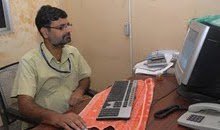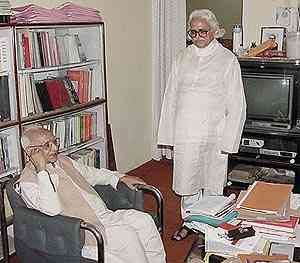 ‘Kissa-e-kakul o rukhsar liye ayaa hoon/Ishq ki garmi-e-bazaar liye aya hoon/Mujhko seene se laga le mere mehboob-e-watan/Apna toota hua pindar liye aya hoon.’’(I’ve come with the tale of my beloved’s locks and beauty, I’ve come carrying the warmth of love, O my motherland, embrace me close to your heart, I’ve come calling with my broken mirror).”The voice on the TV screen was choking. Tears were rolling down his eyes. ‘Kissa-e-kakul o rukhsar liye ayaa hoon/Ishq ki garmi-e-bazaar liye aya hoon/Mujhko seene se laga le mere mehboob-e-watan/Apna toota hua pindar liye aya hoon.’’(I’ve come with the tale of my beloved’s locks and beauty, I’ve come carrying the warmth of love, O my motherland, embrace me close to your heart, I’ve come calling with my broken mirror).”The voice on the TV screen was choking. Tears were rolling down his eyes.
The camera had zoomed in on the face. And I thought this is the man whom I’d been invited to meet. Since the TV set was facing the drawing room door the first thing to catch my eye was the man on the screen, standing and reciting his poems.

Akhtar Payami with his brother(standing) Jabir Hussein
(photo: Deepak Kumar)
Meet Akhtar Payami, poet and Senior Leader Writer of The Dawn.My urge to meet Payami was aroused the moment Bihar Legislative Council chairman Jabir Hussein told me: ‘‘My brother Akhtar Payami has come to meet us after 12 years.” Hussein reminded me of an article on divided families in India and Pakistan that I had written on the eve of the Vajpayee-Musharraf summit meeting in Agra. My instant plea to him was: ‘‘Could you please arrange for a meeting with Payami?’’ I had written about him in that article but not had the honour of meeting him in person. Hussein obliged, and invited me to his house the next day. His staff guided me to his drawing room in his 2-Kautilya Marg residence. That’s when I saw Payami on the screen and moments later in person.
Payami’s brothers Sayeed Anwar, Sheen Akhtar, Jabir Hussein and their wives, his nieces and other members of the family were glued to the TV screen. The footage was shot when the Karachi-based poet and Senior Leader Writer of The Dawn had been in Patna in 1992.
But Payami didn’t seem interested in the footage; instead his gaze was moving from one brother to another, to his nieces and the others in the room, perhaps to capture them in his ageing eyes forever. The septuagenarian Pakistani, the eldest of the siblings, seemed to be doing so because he was not sure whether he would be able to return to his land of birth again. When the architect of Partition Cyril Radcliffe drew the line to divide the country in 1947, Payami was working as a journalist with Morning News in Dhaka in erstwhile East Pakistan. He became a Pakistani national by default while the other members of his family remained Indians. But Payami’s nazms (free verse) reflecting the pains of being separated from his motherland and the desire to embrace it still defy that line of divide. Whenever he has visited Patna he has felt like rushing to the banks of the Ganga and to the nearby Patna College. Payami graduated from Ranchi College and got admitted to Patna College in 1946 to do his masters in Economics. “I still remember... the professors loved me because I was a good student”, says Payami. “I was the eldest in the family and supposed to help my younger brothers.” His voice chokes again as he wipes the droplets in his eyes. “I feel like a traitor who fled without fulfilling his family commitments.”
Given the hostile Indo-Pak relationship, it’s not easy for Payami to visit his loved ones in Patna often. The same applies, in reverse, to his relatives here in India, especially because the air link between the neighbours has been suspended. Even the Sada-e-Sarhad bus service, that Prime Minister Atal Behari Vajpayee inaugurated in 1999, was suspended after the Kargil conflict. It’s less than an hour drive from Lahore to the Wagah border near Amritsar. But Payami had to fly from Karachi to Dubai, from where he took another plane to New Delhi to be received by Jabir Hussein and other members of his family. The entire family then took a train to Patna.
“I’ve been here for the last four days and will return to Pakistan tomorrow,” Payami said when I met him on 18 April, with Hussein, the youngest of the siblings, standing beside him. Payami’s visit to India coincided with Vajpayee extending the “hand of friendship” to Pakistan at a meeting in Srinagar. During Payami’s visit to Patna, Hussein’s house became a virtual symbol of cross-border solidarity. Payami doesn’t have faith in the “ruling cliques” on either side of the divide. “There should be more people-to-people interaction… to facilitate peace and harmony… The ruling cliques have vested interests in keeping the anti-India and anti-Pakistan flames alive…’’
What’s the atmosphere back home in Pakistan? Payami cites the question of his minor granddaughter to give an idea of the situation: “You know, my granddaughter asked me – Dada, aap enemy country mein kyon jaa rahe hain (Grandpa, why are you going to an enemy country)… This is the atmosphere the post-Partition generation is growing in… which is more dangerous for the peace and prosperity in the sub-continent.” Payami regrets that his innocent granddaughter will never be able to assess his feelings for his motherland, for she, like other post-Partition children in India, is growing up in a different atmosphere. He regrets that the Pakistani government stopped some people from Lahore from lighting candles of friendship on the no man’s land at Wagah border. The same no man’s land where Sa’adat Hasan Manto’s Toba Tek Singh died. Bishen Singh, an inmate of a lunatic asylum, was also known by his village’s name in Punjab, Toba Tek Singh. After Partition Toba Tek Singh didn’t know whether he was in India or Pakistan. In fact, he didn’t want to be in either; he just wanted to be in his motherland. Manto’s end is the tale of hundreds of thousands who died during Partition or lived to bear the unbearable pain of loss and separation: “There, behind barbed wires, on one side, lay India, and behind more barbed wires, on the other side, lay Pakistan. In between, on a bit of earth which had no name, lay Toba Tek Singh.”
The British took only a few weeks to divide the country, assigning the responsibility to Cyril Radcliffe, who had never been to India before. Radcliffe stayed in New Delhi for only five weeks, went through the outdated census reports and rudimentarily redrew the map to divide the country.
Sadly, those census reports and maps didn’t suggest the enormous plight that was in store for Payami and hundreds and thousands of people like him on both sides of the divide. And Radcliffe was perhaps least bothered about such things. That historical wrong can’t be righted. India and Pakistan are a reality and we have to accept it. But, says Payami, “the two neighbours can prosper only if they have a friendly relationship… a relationship based on trust, love, honesty and respect for each other…’’.
Can the Kashmir problem be solved? Payami says: “The leaders on both sides should talk without prejudice, arrogance and ill-will... only talks based on honesty and goodwill can solve the problem.’’ India and Pakistan have fought three wars and done almost nothing to restore permanent peace. But Payami has done his bit to cement his ties with his motherland. He has got one of his four sons married to the daughter of his Indian brother Sayeed Anwar.
Payami also has a daughter. The Muslim custom of marrying in the family gave him with the opportunity to bring all members of the family together in 1992 when the marriage was solemnised.
Nalin Verma, currently Asst. editor Telegraph, had written this article when he was the Statesman’s special representative at Patna.
|
